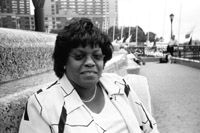 |
 |
|
Outsourcing Compassion Brenda DeStephano was just arriving at her office at the World Financial Center on September 11, 2001 when the first airplane hit the World Trade Center. Debris rained down on her where she was standing in the plaza. "I felt this heavy thing hit my back and hit my body. It hit me so hard it knocked me off my feet. I found myself just laying there on the ground, covering my head. I was just so frightful," says DeStephano.
"Almost immediately you saw people talking on TV and in the media about the psychological effects, the fallout, that we were to expect." Herbert continues, "And we were essentially told that the country was going to fall apart because everyone was going to have post-traumatic stress syndrome and depression and this sort of thing, and you had therapists from all over the country start mobilizing and moving into the New York City area to treat these throngs of victims who were destined to have all kinds of psychological problems."
Debriefing is based on the idea that people need to tell what happened to them, to unburden themselves and to make sense of the experience. It also typically involves explaining how trauma may affect the people in the group. Common symptoms include sleeplessness, irritability, and avoidance of situations that remind them of what happened. Crisis Care Network told its clients - the employers - that debriefing helps workers get back on the job faster and cuts down on absenteeism and turnover. Bob VandePol, the company's president says, "For folks who are right now feeling like a glob of jelly because they were just terrorized, it's important to have someone come along and be a bowl to put them in so they don't feel like they're going to quiver and fall off the table." But psychologist James Herbert says the problem is, the bowl may help mold the jelly because, "If you give them the message that says that you are likely to develop whatever kinds of symptoms those are-list, fill-in the blank, list the symptoms, many people will go on to develop those symptoms."
Continue to: Part 2 | |||||||

